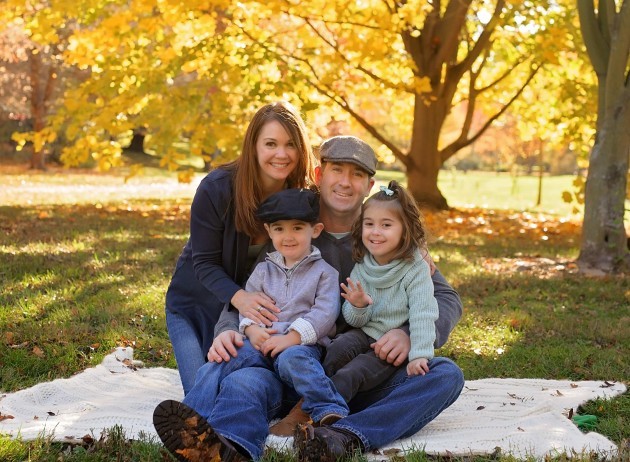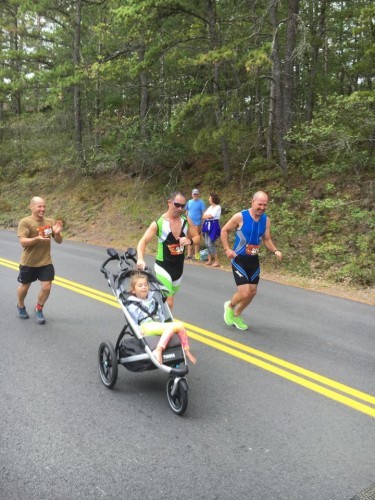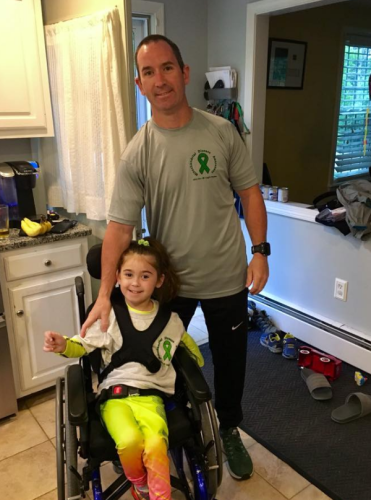Updated 17.23
AT THE AGE of just nine months, Abby MacCurtain’s family were told that she had roughly two years to live.
She was diagnosed with Leigh’s Disease — an extremely rare, life-limiting disease which affects the central nervous system, and bodily functions like breathing, eating and movement.
Fast forward to 2017, and she has miraculously defied the odds to reach the age of six. And she’s currently preparing for the adventure of a lifetime alongside her family.
Abby and her father, Greg MacCurtain, are making the trip from Boston to Cork this coming week — where they will participate in the Cork City Marathon next Sunday, 4 June.
MacCurtain is set to run the 26.2 miles whilst pushing his daughter in a stroller.
A wheelchair user for much of her young life, Abby’s disease has stopped progressing as of now. Her day-to-day life is very different to other kids of her age though.
She’s unable to carry out other basic bodily functions like talking or eating — she uses a feeding tube. All you have to do is look at photos though to see how full of life the Boston 6-year-old is.
“She’s a fighter,” MacCurtain tells The42. “She definitely has the strive and the will to live, and be happy and make a difference. We’re just trying to make that wish come through.
“We try to get her out there in the community and have people meet her. You and I wouldn’t be having this conversation if Abby wasn’t doing the marathon. This brings about awareness for her and this is our way of doing that.”
The father-and-daughter duo have been running together for the past three years or so, and it all started as a way to get Abby out of the house.
Last year, MacCurtain met up with a coach and decided to explore further options. They did a triathlon together towards the end of the year, and Abby really enjoyed it. The sights were then set further afield.
“I would run a lot with her but I didn’t really have a goal. As far as she enjoyed, we would just run around town. I was getting up to 12 or 13 miles, and I’m saying ‘I can definitely do this.’
“The triathlon this past Fall was definitely a big thing, but I guess we kind of did things backwards. Doing one thing, I kind of get bored of it, so we introduced her to the bike and the swim, and she loved it.
“Now, we’ve got to try something longer, and bigger — the marathon. It’s a big challenge. Abby likes being outside and she loves the wind in her face. She’s nothing but smiles. She’s a big people person, so the crowds — she’ll be watching, she’ll love it.
MacCurtain, who now works as a fireman at Logan International Airport, recalls that long before Abby’s diagnosis, he ‘just knew something wasn’t right.’
He’s been a fireman for 15 years, and prior to that, he worked for Boston Emergency Medical Services in the ambulance department.
“They train you very well. I just knew something wasn’t right, I just didn’t know what.
“She was making all sorts of breathing issues. She wasn’t meeting any milestones. She had real difficulty feeding with the bottle, she was spitting up an awful lot.
“I brought her into a pediatrician so many times with these complaints, and they were kind of just chopped off as new parent anxiety, and that she’ll outgrow the difficulty feeding.
“What they were saying was that she had this kind of floppy airway, and usually a baby outgrows it by six months of age. It was kind of one thing after another and they really weren’t picking up on anything.”
From there, MacCurtain and his wife, Heidi, brought Abby to several specialists across different backgrounds. They had no luck, with each doctor offloading the issue onto another.
“Heidi didn’t want any bad news, she was just trying to see the positives, that she was going to outgrow it. But in the back of my mind I’m like ‘she’s sick and I don’t know what the hell it is.’
Meanwhile, Abby’s symptoms were deteriorating by the day. In a twist of fate, her regular pediatrician was unavailable on one occasion, so an appointment was booked with another.
“There’s something definitely going on,” the new pediatrician said. “She needs to be admitted to the hospital.”
Those two sentences brought mixed emotions for the family. There was a slight sense of relief that they were finally being listened to and making progress. But the over-riding fear and worry was ever-present.
In the hospital then, it was decided that a brain MRI should be carried out.
“That’s when they found the lesions in her brain,” McCurtain continues, his voice breaking slightly. ”In the main core of her brain.
“If you unwrap a baseball, you know the way there’s a rubber ball in the middle of it? Essentially that part. It controls all your major functions — your breathing, eating, your ability to co-ordinate.
“They gave her about two years to live.”
There’s over 200 types of mitochondrial diseases, and unfortunately Leigh’s is the most fatal. It’s quite difficult to diagnose as there are several different clinical presentations and mitochondrial disease may also mirror many other conditions.
“The mitochondria is essentially the powerhouse of the body to supply the body with energy,” MacCurtain explains. “When we eat food, it turns food into energy — ATP it’s called. Essentially, Abby has a breakdown somewhere that her body is unable to do that.
“The lesions in her brain were essentially dead and dying cells because the body couldn’t produce it to keep those cells alive.
“Right now, it has kind of plateaued, essentially. The disease has stopped progressing. We don’t know when it will kick back in, but right now, things are good.”
Thankfully, things are as good as they can be at present, but at that very moment Greg and Heidi MacCurtain discovered their daughter’s fate, their world came crashing down.
It took a while to come to terms with Abby’s condition, but life had to go on. They welcomed a son into the world, Tomas, and he’s four now.
Of course, he had to be named after MacCurtain’s great granduncle, the former Lord Mayor of Cork, and that’s why this marathon had to be the first one that was hit.
While in Cork, MacCurtain is keen to trace his Irish roots and family tree.
“We’re all excited to go over there and make it to Ireland. It will be a great experience. It means a lot and I set the tone for that — that I want Cork to be our first.
“I always wanted my son named after my great granduncle. I always had a passion for where we came from, and when you find out the history behind it, it’s very humbling.
“What those guys stood up for at the time wasn’t very popular. They made the difference to essentially what Ireland is today.
“To give things all up for a bigger cause, that’s humbling. I see it in my own kids, I see it in Abby. That’s how I’ve tried to raise them, to essentially stand up for your fight. I see Tomas, and he says ‘Dad, I fell down,’ and I say ‘get back up,’ and he does — that’s all that matters.”
In terms of training for next weekend’s marathon, it’s been a mixed bag over the past few months. It varies from day to day, between the gym and running the roads.
MacCurtain links up with a coach in the gym for circuit-type training three or four times a week, while he runs at least twice.
“A friend of mine who was an Olympic cyclists trains me. I go to the gym at five in the morning before the kids get up, and he definitely kicks my butt.
“The gym is cardio, strength training — I’ve never taken HIIT class but it would be similar. It’s all based on my heart-rate.
“Running-wise, I try to get 30-40 miles in a week. For some, maybe that’s not a lot, but everything I’ve been told — if you go too much you start breaking down the muscle. I’ve been trying to do hills and steps and intervals.”
Abby doesn’t accompany him every time he runs — he often uses a 40-pound sandbag in her stroller — but she sure pushes MacCurtain on when she’s there.
“When I go the long miles with her — getting up to eight, nine, ten miles — I ask her ‘will we keep going?’ and she’ll say ‘yes’.
“She’s not verbal, she can say Mama, Dada. But that was awesome when she started to say that. Other than that it’s yes or no with a head tilt and she can do some sign language.
“If she tells me to keep going, we keep going though.
“I’m not too overconfident but I’m not gonna kill ourselves, we’re just going to finish. We just want to finish. It’ll be difficult, but she’ll give us confidence and motivation.”
The42 is on Instagram! Tap the button below on your phone to follow us!




